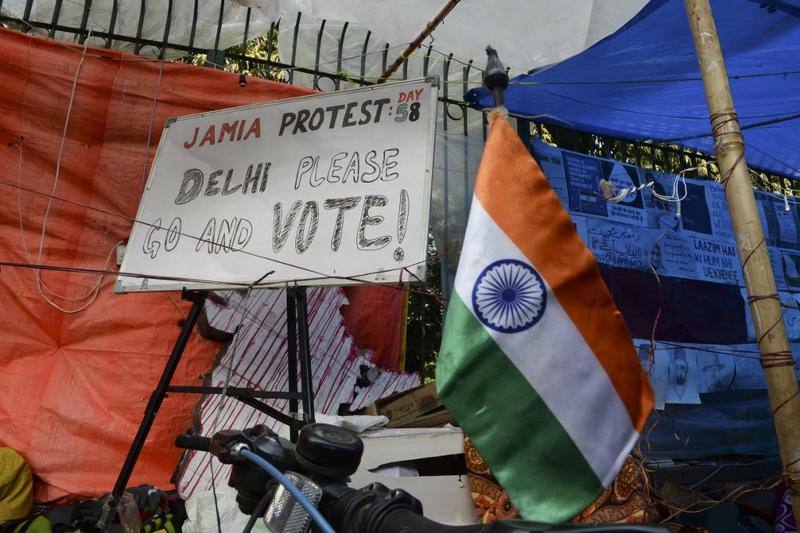 A placard reading 'Delhi Please go and Vote' is pictured along a road which was temporarily closed following protests against India's new citizenship law, during the Legislative Assembly elections, outside Jamia Millia Islamia University, in New Delhi on February 8, 2020. (SAJJD HUSSAIN / AFP)
A placard reading 'Delhi Please go and Vote' is pictured along a road which was temporarily closed following protests against India's new citizenship law, during the Legislative Assembly elections, outside Jamia Millia Islamia University, in New Delhi on February 8, 2020. (SAJJD HUSSAIN / AFP)
NEW DELHI — Voters in New Delhi began voting on Saturday in a state election seen as a test of Indian Prime Minister Narendra Modi’s popularity following months of deadly anti-government protests over a new citizenship law.
The election comes as India’s economic growth is at its slowest in six years, and amid strong opposition to the law which makes it easier for non-Muslim persecuted minorities from three neighboring countries to become Indian citizens.
Urging the people of Delhi, especially my young friends, to vote in record numbers
Narendra Modi, Indian Prime Minister
ALSO READ: Indian police ban protests amid citizenship law outrage
The law has stoked suspicion that Modi wants to turn secular India into a Hindu nation, something he rejects.
A poor showing in the capital this weekend could be another blow to Modi’s Hindu-nationalist Bharatiya Janata Party (BJP) after it lost control of Maharashtra state, whose capital is Mumbai, late last year.
Modi appealed to voters to exercise their franchise. “Urging the people of Delhi, especially my young friends, to vote in record numbers,” he wrote on Twitter.
Polling is underway for 70 seats and the results will be announced on Feb 11.
The contest to win New Delhi is between the BJP and incumbent Chief Minister Arvind Kejriwal’s regional Aam Aadmi party (AAP).
READ MORE: Women at center stage in Indian protests against citizenship law
AAP has highlighted its work over the last five years to fix state schools and healthcare in the city of more than 16 million people.
The BJP, however, has focused on the work of Modi’s federal government since its re-election last May, in particular changes that have appealed to the party’s Hindu base such as reforms in the disputed Kashmir region and a court ruling, backed by the government, clearing the way for the construction of a Hindu temple on a long-disputed site in northern India.


